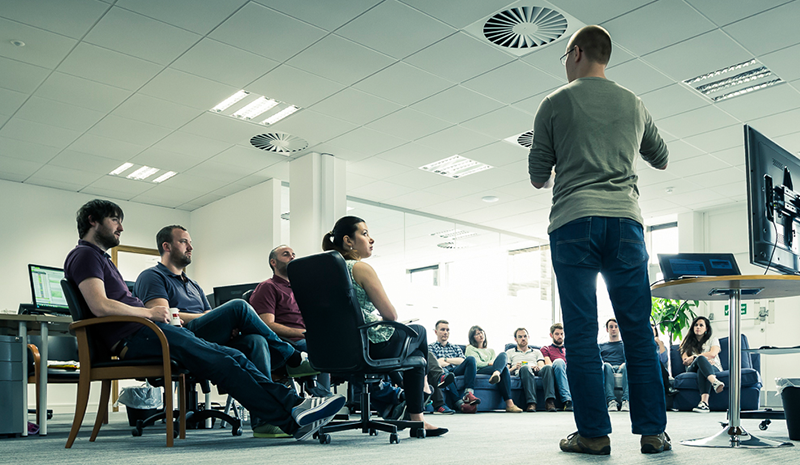By Alan Coleman on 18 Jul 2017
Speaking at Wolfgang Essentials in 2017, Alan, Rob and Zoran revisit the seismic Twin Tech Earthquakes that took place in 2016 and their impact on our lives. Below you can watch the talk in full from Google's Foundry, read a transcript of the talk and look through the slides on The Twin Tech Earthquakes of 2016.
The Twin Tech Earthquakes of 2016: Video
The Twin Tech Earthquakes of 2016: Transcript
Introduction
Al: This next talk is going to be me Rob and Zoran. We're going to talk about the Twin Tech Earthquakes of 2016. Every January, all the business leaders of the world gather in Davos and they talk about what's happening this year. This is a quote from Davos this January:
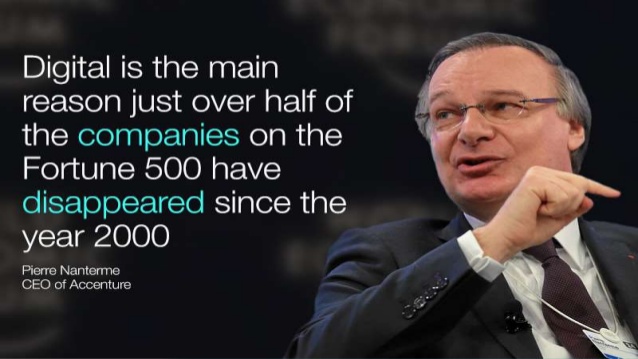
So, this trend that Pierre is talking about and at Wolfgang Digital we believe this accelerated in 2016. We believe this is going to reshape work, reshape life and reshape Society, in the very near future. So, the first of those seismic events was this; for the first time in the history of Wall Street, there was an all tech top five. That means the five largest companies in the States, and ergo the world, by market cap were all technology companies. We'd Apple, Google, Microsoft, Facebook and Amazon. So normally on that list you've got a power company.
You've got Exxon or you've got a bank, financial company Berkshire Hathaway would often be there. You might have a property company or a traditional retailer like Walmart. They're all gone and now it's all tech. There's so just so much we could infer from this but I want to focus on two things.
Wall Street Top Five Dominated by Tech Companies
The first one is that this illustrates is the world's most valuable commodity is not oil, money or property. Today, the world's most
valuable commodity is now your attention. Okay, so think about that. Think about those top five companies. There is now global attention marketplace. Apple is the company that invented the devices which created this global attention marketplace. Google and Facebook, also in the top five, are the two biggest sales houses of attention in this global attention marketplace. What does this global attention marketplace look like? It looks like this dude and his cat, times 3.5 billion:
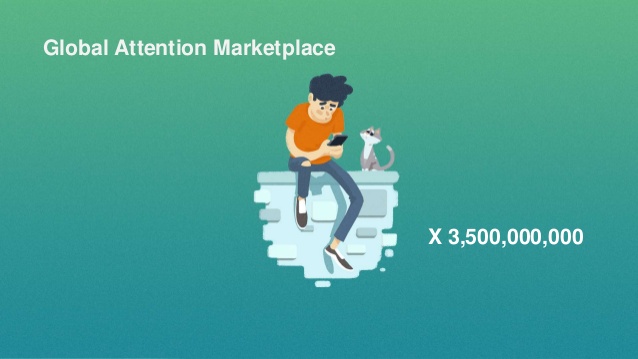
Half the people on planet earth are reachable by marketers. What an opportunity, we've never seen anything like this before. So what? What does this mean to you what this means to people in business?
A really prescient essay by Silicon Valley VC Mark Anderson, back in 2011, had the title "Software is Eating the World" and I think Wall Street has verified this hypothesis by now last year as the market valuations demonstrate that correct. One of the very scary things Mark said in this essay was that every company needs to become a software company. Essentially, what we're learning here is in order to not just thrive, but to survive in business going forward tech is the very central part of what we do. And this is scary, like hands up in the room, who can code?
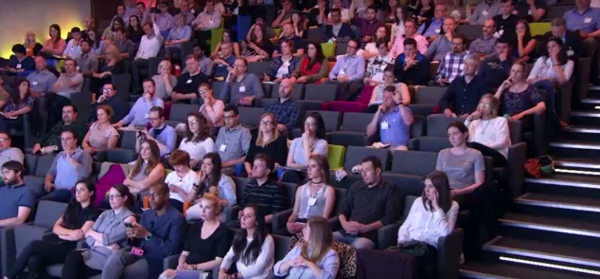
Ok, so we probably got 10% of the people in the room. What's been presented to the most senior business leaders in the world now is in order for your organisation to live, to survive, you're going to have to embrace this skill you know nothing about. You've never done it before. And, yes your mission is to survive it is to embrace it and that's a very scary thing for people to do.
So, what we've been doing in Wolfgang over last year and a bit, is we've had a secret project. It's no secret now as we're telling you all about it, but we've been working on Secret Project Cyborg. Our whole philosophy on technology is that we're not scared or we don't think the machine is going to replace our roles. We think if you're working in an industry where you're striving to be the best, not the cheapest, but if you're striving to be the best the best results will come from the combination of humans and machine. That's our thinking. We're empowering, we're training our digital marketers in code so they can develop their own little bits of tech to sit on top of Google's tech, to sit on top of Facebook's advertising platform and to supersize the results.
With that in mind, I'm delighted to welcome Rob to the stage and he's going to talk you through a few case studies of how we've been doing.
Wolfgang's Secret Project Cyborg
Rob: Thanks, Al. Hello, everybody. Hello, 360 camera. Yeah, I'm gonna take you through our Secret Project Cyborg and specifically look at three ways we've been using it for our clients and also for ourselves in order to increase the power of the digital marketing campaigns we're already doing. So, the three examples going to take you through.
The first one is looking at the optimisation data that you have that you. So, the optimisation power that you do from one campaign and trying to spread that out to all of your other campaigns and to save yourself a bit of time.
The second example I'm going to look at is really looking at using data that you already have from your own website and integrating that with your digital marketing campaigns to increase the power of what you're doing online.
The third example I'm going to look at is trying to measure what you're doing offline online so trying to attribute a return on investment to your channels, like your radio and maybe your TV or print advertising.
Smart Safeguarding of Your Brand
Some of you may have seen this in the news, maybe two or three months ago now. Google got into a little bit of trouble because a very small fraction of the ads which were being shown on the Google Display Network were coming up on this kind of poor quality websites on the Google Display Network. Or ads were appearing next to extremist content; the likes of the likes of Breitbart, for example. It was a very small number of ads which served from the Google Display Network, but the issue was, that in some cases, it was public money funding these and these ads. Google has taken a lot of steps in order to make managing and where your ads show a lot easier and a lot more effective.
We were kind of surprised when this story broke because it was something that we've known for a while. One of the brilliant things about the Google Display Network is that it's the biggest network of websites in the whole world and there's always going to be a couple of poor quality websites which slip through the net. We take it a couple of actions, we've built up a number of placement blacklists that we don't let our client's ads show on. We do manual placement optimisations where we
literally manually check each individual URL to make sure that it's okay and that we don't mind our ads showing up there. But we've also used an AdWord script to look at this. What this script does is, you can see the top line there the TLDs, we're able to define a number of top-level domains that we know tend to be kind of poor quality websites like of your dot downloads and your dot xxx, not that anyone here would have ever been to a website like that.
By using this script we can proactively and at scale, cut out all of those websites and make sure that none of our clients' ads are showing up on any of these dodgy placements.
We Love a Good Script
The second example I'm going to take you through is one you might have heard us talk about before. We're big fans of this script and it solves a problem that exists for every e-commerce retailer really. You could have the greatest Google AdWords campaign in the world with these beautiful ads, lovely ad extensions, brought to a brilliant landing page. But if the user gets the page and your products are out of stock, it's a terrible experience and they're just not going to come back. Al just spoke about how attention is a really valuable commodity and you're just going to lose that person's attention. They're not going to come back.
We ran this script in particular for one of our clients, McElhinneys, who took home one of the Landy's Al spoke about earlier. They've got over 350 brands everything from 1880 Club all the way down to Zeila so they're stock levels are coming in, they've got new brands coming in all the time everything is constantly rotating. It's really hard to stay on top of it and make sure that every minute or every day we're not sending anyone to a landing page where the products gonna be out of stock. So we use an AdWords script. Again, this script basically looks for instances of the phrase out of stock on all of the landing pages from our ads and if it finds it on any of those landing pages it'll automatically pause the ad so we can spend that budget in other areas.
By implementing this script we were able to boost the first click assisted revenue and which came from these generic brand campaigns and 10x assisted revenue driven by a very simple switch and making sure we were using our budget in the right areas.
Measuring Offline Activity Online
The third example I'm going to take you through is really our search for the Holy Grail of digital marketing. For us, the Holy Grail is trying to figure out and trying to measure what we're doing offline and the impact that's having and attribute a return on investment to that. So we can say we spent this and this is how much we returned overall while used to doing online. Before I go any further I just gotta say this example is brought to you by the letter R. R is a programming language used by the data scientists and in order to make and create robust projections and forecasts that we can use to work out things like measuring offline performance online. So how does it work? We can create forecasting models:
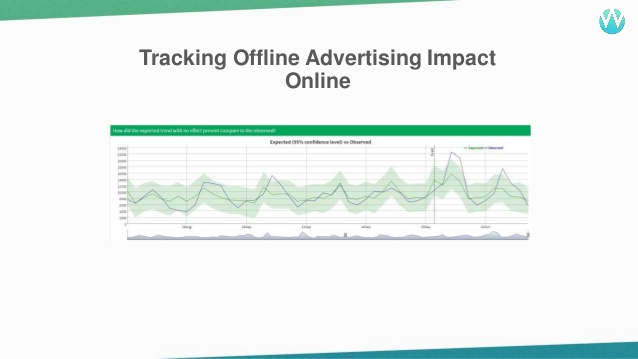
You can see here this blue line is the observed or the actual performance. The shaded green area is the range of expected performance we'd expect to see if there was no external factors and is affecting our campaigns. You can see here we have the dotted line for events that is an external factor. In this case, it's a radio advertising campaign.
You can see that after the radio advertising campaign starts the actual performance of our online campaigns starts to go out beyond the expected range that we forecasted. By using a halt winter triple exponential smoothing function, which I love saying in every presentation I possibly can, we can turn that last graph into this graph.
This graph basically is the incremental performance driven by the event which in this case is the radio advertising we can hold this to really highly statistical confidence interval of 95%. This is actually what the FDA used in the US. to test new pharmaceuticals we can say "okay, that's a statistically significant level we're actually able to measure" and that there was a 19% boost in online revenue on the back of that radio ad.
We can then say we can then go back the client we can say this is how much you spent on your radio this is how much that return online this is your return on investment. We can give a really clear picture as to how those offline channels have performed.
I'm going to pass you back to Al now who's going to take you through the second Tech Earthquake of 2016. Thanks a million.
Artificial Intelligence
Al: Thanks very much Rob. the second of our Twin Tech Earthquakes of 2016 is this:
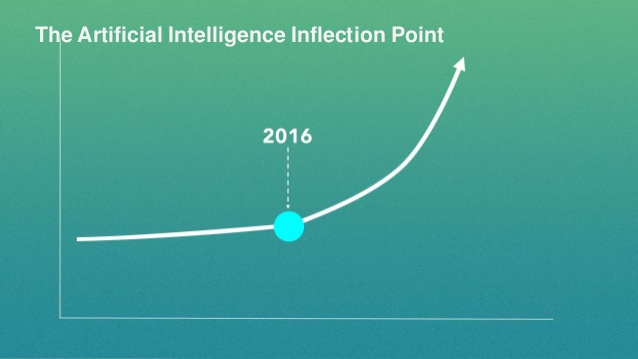
2016 was the year that Artificial Intelligence, machine learning, reached an inflection point. It finally became functional, or you could say that the singularity occurred. So a couple of examples that illustrate this.
Google's AI Bests Go World Champion
Number one, Google's AI beat the Go World Champion. Go is an ancient Chinese game and it's said to be a lot more complex than
chess, one of the most complex games out there. The sequence of moves that the AI used to beat the world champion had never been seen before. The vanquished champion thought these moves were so beautiful he actually cried and then, this is the bit that I loved, and the next time he went day to play Go he started making moves he'd never used before, to go on and improve his play.
So, that hypothesis we made a little while ago was "the greatest performance comes from the combination and of human and machine". I think that that illustrates that point nicely.
Google Translate 10x Improvement Overnight
Another case from 2016 is Google Translate gaining ten years progress over night. You're all familiar with it and it's been the butt of many jokes over the years for bad translation. Something happens in the first half of 2016. Overnight they turned on artificial intelligence or more accurately they turned on machine learning and Google Translate doubled the progress it had made since its inception, ten years ago. So consider the implications from this for an industry like the translations industry. What does that mean for them? What does that mean for people who want translations as well?
Google is Not Just a Search Engine
So you might say, "okay, Alan like these are very Google focused examples of AI", and IBM have been doing really interesting things with machine learning for it for two decades. I believe Google is best positioned of any company to really own machine learning; let me explain why.
Anybody familiar with Kevin Kelly? Kevin Kelly is one of my technology heroes. He writes brilliant books and he's had a couple of super TED Talks. He tells a story in his book, "The Inevitable" where he's back at a party in Silicon Valley back in 2002. He's talking to the Google guys and at this stage, Google has literally just put ads on the search engine and. Kevin's sceptical, believe it or not, that these ads on a search engine are really going to be a business. The Google guys respond that we're not actually building a search engine business we're really building an artificial intelligence business.
Google's Real Mission
When I read this my mind exploded and I got it. You know that lots of great businesses have a secret plan. Like for example McDonald's, everybody thinks it's a fast-food restaurant. Really, it's a property company that uses burgers and chips to acquire a prime real estate all over the world. When I read this I thought, I've got it, this is Google's secret plan.
Google's stated mission is to organise the world's information make it universally accessible. Google's secret mission is to monitor the world's interactions with the world's information that's how machine learning learns. Think about it right now, Google sits between humanity and all the information of humanity. There are billions of searches every hour and every time someone conducts a search and comes to a bit of information, interacting with Google, it's getting smarter. Powerful stuff.
Just like we stated, in 2017 the world's most valuable commodity is now your attention. We believe by 2020 the world's most valuable commodity will be intelligence, so let's talk about this a little bit less explorative.
The AI Societal Revolution
We believe we're on the cusp of the societal revolution and so what is a societal revolution? It's essentially a moment in which humanity figures out how to increase output so jump back to the Industrial Revolution. Prior to the Industrial Revolution, all power was human power or beast power. I don't know if we invented it or we discovered it but artificial power became a thing. Once we had artificial power, manufacturing emerged and all of a sudden we could build things and output dramatically increased. So that's artificial power.
Over the last century, the service economy has really come to the fore. You can pump all the power into a translation agency, you can put the lights on as bright as bright as this and you can have massive screens. It just doesn't increase output. However, if you can pump intelligence into a translations agency, artificial intelligence, just like the artificial power replaced human grunt, artificial intelligence can replace human education. You can dramatically increase output and that's
where we are.
So, another quote from Davos back at the beginning of the year:
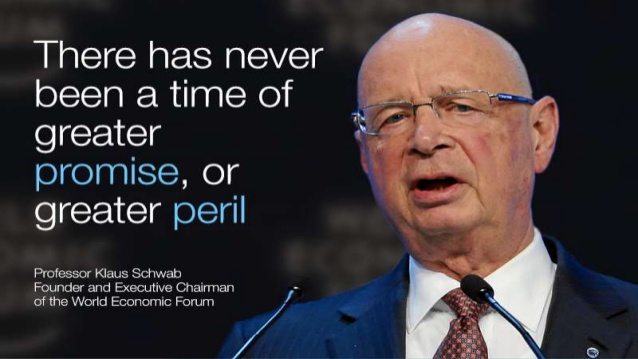
I'm delighted to welcome Zoran to the stage. Zoran is going to talk to you about the AI arms race and the battle between good and evil at the heart of it.
The AI Arms Race
Zoran: Thank you, Alan. So, I'm going to show you three examples of how machine learning can be both a force for good in the world how it can increase convenience in our lives even more. But also, how it can be potentially dangerous.
Doctor Watson
The first example is IBM Watson and it's specifically their health app. So this is an app that doctors can use to make their medical decisions a bit more accurate and a bit better. There's been a famous example of a sixty-year-old patient who didn't react well to the treatment. So, they're really afraid that they misdiagnosed her. They said "sure, let's let's see what Watson can do let's give Watson a try."
What Watson did promptly is it went through millions of cancer research papers, went through all the genetic data of the patient, went through the medical history and diagnosed the patient with a really rare form of leukaemia, recommended the treatment that ultimately saves the patient's life and it did all that in ten minutes. So when Al is talking about increased output of intelligence this is exactly what he means. So all that in ten minutes.
Amazing Amazon
The second example is that of convenience. We know that Amazon is all about delivering products for cheaper and sooner as well. Back in 2012, they patented their delivery system that today is responsible for one or two-day delivery that some segments of their customers enjoy, specially in the US.
What they look at is all the older historical data, all the purchase history of their users and they actually predict how many new JK Rowling's books how many new iPhones or drones are going to be purchased from each area of United States. And what they do they preemptively package those products and ship them to those areas to the to the nearest distribution centre. So by the time you decide to order that product is already on its way to you. If you ever hear about someone getting the product a few hours after they ordered, this is exactly because of this. Because that product was already in the truck going to that person's neighbourhood.
AI in Trumps Rise to Power and Brexit
Finally, we have probably the most famous example lately of how machine learning can be potentially dangerous and it's an example from a company called Cambridge Analytica. Coming out after US presidential elections and actually saying that they had a role to play. We later found out that they had a role to play in Brexit as well. So what they said is "we had a great impact on results using big data to micro-target and analyse individuals". We don't actually know if their impact was really profound or not. However, we know the underlying principle behind their methodology. It's really fascinating.
So it's a method by Michal Kosinskiy, a psychometrician from Stanford University, that developed an app that looks at your Facebook likes and will actually get your personality profile based on on the "big five" or the "ocean profile". It's really accurate. So seventy likes will actually get your personality profile better than your friends can get it. 150 likes better than your parents getting it. 300 likes can get a better profile than your partner and if it has more it can actually go as far as knowing you better than you know yourself. So Alexander Nix CEO of Cambridge Analytica actually came onstage and explained how they used it in elections. So he gave an example of highly neurotic and conscientious person and said this is this is a person that needs that needs a fear-based rational message.
On the on the issue of gun rights, they would show them a picture of someone breaking in and saying this is really an insurance policy. For someone that is closed and agreeable those are people that that value family habits and tradition, they would show them a completely different message and any picture that really resonates with them. What they wanted to achieve was for them to vote one way or if they're going to vote the other way they want them to just stay out of the ballot box. And we know what the results were in the end after this talk Alexander Nix actually said that this is coming they're going to publish this for commercial advertising so we might as well be looking at the future of digital. Thank you.
The Twin Tech Earthquakes of 2016: Slides
You can view all the slides from this talk below:


.png)
.png)





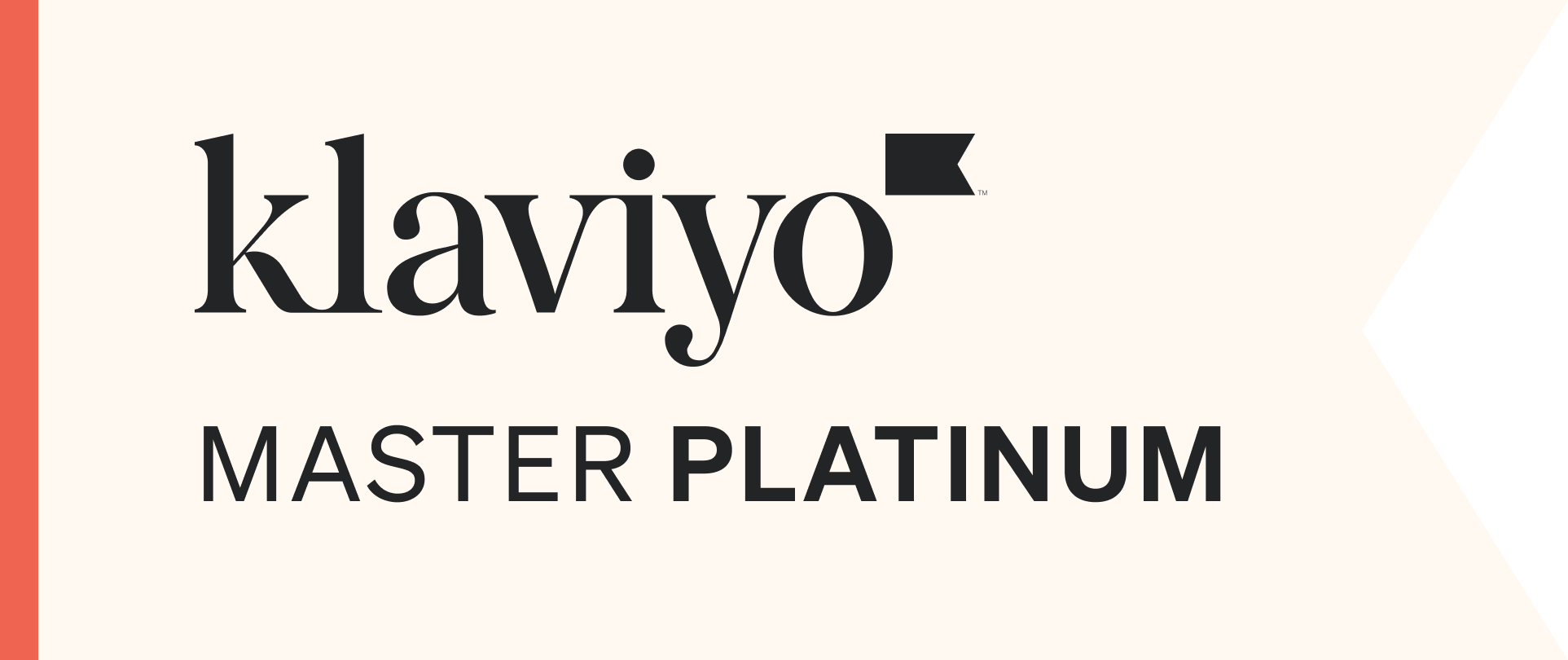
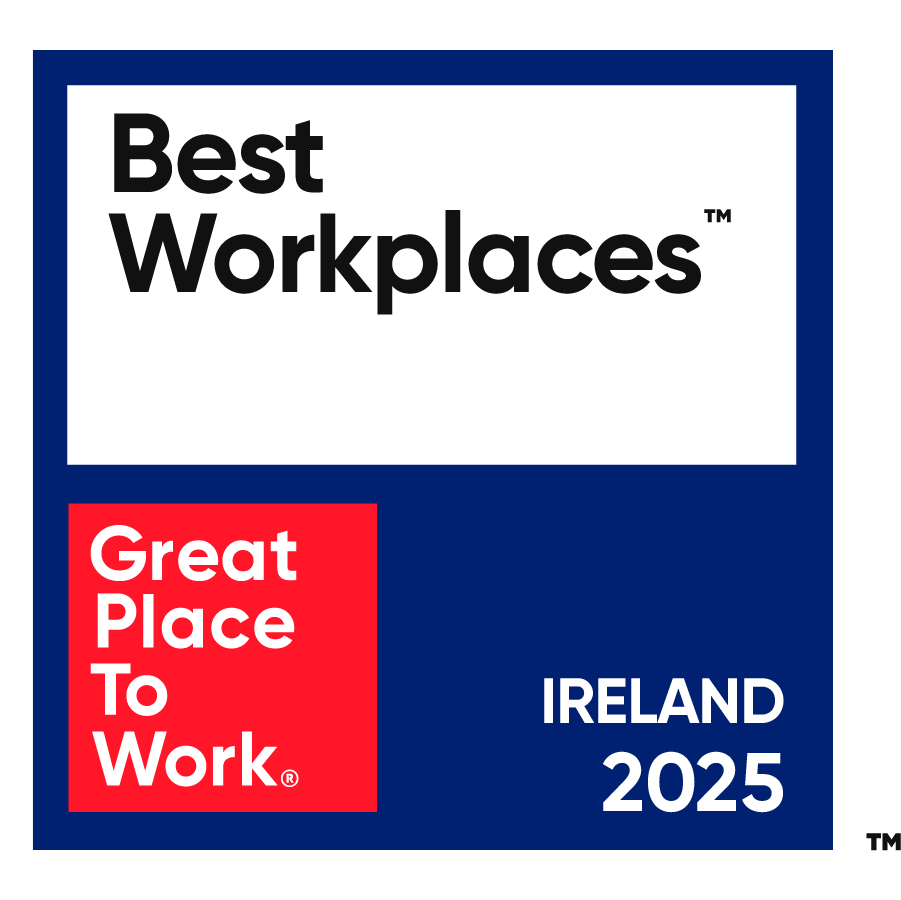
_2025.png)

